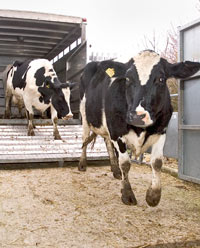Scots call for better enforcement of animal transport rules

Existing controls on the transport of livestock should be properly enforced throughout Europe, before Brussels comes up with any more rules and regulations.
Speaking after meeting the EU Commission this week, NFU Scotland vice-president Nigel Miller said that animal transport standards in the EU were already world-leading, underpinned by competence testing, vehicle authorisations and inspections.
“While the UK has an excellent record on animal welfare and compliance with the rules, unacceptable failings are still occurring across mainland Europe,” he said.
“We remain adamant that the EU must not regulate further in this area, but instead concentrate on enforcing the current regulation properly. It is a matter of making these world-leading standards work in all member states and looking at smarter ways to enforce the rules.”
NFUS had previously sent a working document to the EU Commission, suggesting ways of improving the current system.
“It outlines a pilot project to test new ways of using satellite surveillance to ensure that all EU member states adhere to the current regulation,” said Mr Miller. It also suggests that vets operating in meat plants should also play a greater role in ensuring compliance with requirements.
Mr Miller said the NFUS delegation had an open and constructive discussion with the commission and received assurances that a report on how the existing animal transport legislation is being enforced will take place before any new proposals are brought forward.
NFUS also took the opportunity to discuss the impending EU ban on coventional cages for laying hens.
“To comply with the Welfare of Laying Hens Directive, due to come into force at the end of next year, Scottish farmers continue to upgrade layer accommodation at huge expense,” said Mr Miller.
But many member states would not be fully compliant in time. Mr Miller therefore welcomed reassurances that the EU was rigid on its planned introduction of the Directive on 1 January 2012 and that there was no consideration being given to shifting the date.
“As well as urging the commission to have monitoring in place to deal with the potential problem of illegally produced stocks of eggs circulating internally within the EU, we repeated the need for measures to be put in place to ensure that any eggs imported into the EU also meet the higher welfare standards being demanded of all European egg producers.”
